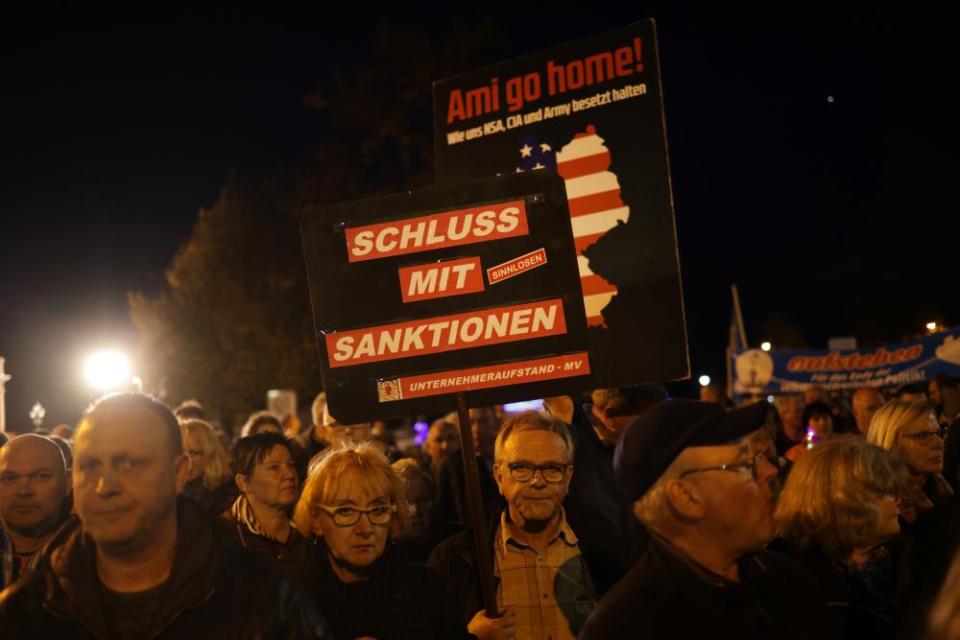‘Angry winter’: Germany’s Monday night protests unite far-right and left

“Shed your sense of powerlessness, take to the street!” a man calls from a megaphone, his cry echoed by hundreds of demonstrators walking alongside him who repeat the chant. “Germany’s going to the dogs, wake up from your sleep!”
Carrying banners and posters, some with strings of Christmas lights draped around their necks, banging drums, others holding blank pieces of paper out of sympathy with Chinese protesters banned from objecting to coronavirus lockdowns, the participants make their fears and anger known during a one-hour procession through the snow-sprinkled streets of the eastern German city of Halle.
Their main concerns are soaring energy costs – they urge the government to repair and reopen the Nord Stream 2 gas pipeline to Russia – inflation, which is at its highest level for 70 years, and the war in Ukraine, to which they believe Germany should not be contributing weapons.
“This is a time to make your voice heard,” Manfred, an accountant, says. “Otherwise you are like a sheep just passively accepting all the shit that’s being thrown at you.”
It is a Monday and for several years, Monday night protests – drawing attention to everything from the “over-Islamification” of Germany to “dictatorial” Covid prevention measures – have become a mainstay on the calendar of many German towns and cities in the former GDR or communist east.

In recent months, it is the cost-of-living crisis that has driven the agenda, with Germans in the east having been hit disproportionately hard by rising prices, owing to having lower wages, smaller pensions and less long-term accumulated wealth – whether property, inheritance or investments – than those in western Germany.
Observers have watched with varying degrees of fascination and horror to see in some cases the far-right and far-left in effect join forces for the first time to voice their anger, as a “heiße Herbst” (hot autumn) has turned into what organisers and media refer to as a “Wut Winter” (angry winter).
To what extent the collaboration was planned or not it is hard to say. But what has emerged is a growing sense of cooperation due to an overlap of issues, elegantly compared to a “horse shoe” shape (the ends of which curve towards each other). There are suggestions that there might even be the possibility of both camps – the far-right AfD and the far-left Die Linke, or breakaway elements of that party, Sahra Wagenknecht and her husband Oskar Lafontaine, the erstwhile Social Democrat finance minister – entering government together.
Everyone is invited into the fold. “Have courage and join us, even if it’s just for a brief while,” a woman in an orange anorak says to onlookers through a microphone, speaking in time to the drum beat.
A music teacher, who gives her name as Janine and does not want her employer to know she’s participating, says she feels empowered by the crowd. “The most important thing for me is that we’re all together, venting our frustration and worries, not sitting at home alone hugging hot-water bottles and wondering how on earth we’ll get through this winter, and then the next,” she says.
Demonstrators’ demands to the government include dropping sanctions against Russia so that it is persuaded to resume its gas flows, doing away with coronavirus restrictions, a rent cap, “and an end to all the insanity”, the protest leader shouts shrilly, to cheers.

The protests are a throwback to 1989, when demonstrations by civil rights campaigners against the police state culminated in the peaceful fall of the Berlin Wall but many are offended by the comparison. In nearby Leipzig, they have hung banners from churches that were at the heart of the communist-era protests, reading: “2022 is not 1989 – we’re not living in a dictatorship”.
The organisers disagree. They compare what they see as heavy-handed, top-down decisions by the state – whether regarding pandemic restrictions (mask-wearing rules are still in place in most parts of Germany) or the decision to place sanctions on Russia as punishment for its invasion of Ukraine – with the authoritarian rule in the GDR. The desire for “Selbstbestimmung” or “self-determination” is frequently expressed and has become something of a buzzword.
Whereas in the past, Monday night demonstrators were more discerning about who they marched alongside, recent surveys show the barriers are down, with 67% in a recent survey saying it was “irrelevant” to them who had called the protest, the reasons for calling it were seen as more important.
The attitude towards the protesters has also changed. In the not-too-distant past their demands were often interpreted as outrageous, or at best out of touch, but sympathy towards them is on the rise. In a recent poll by the broadcaster MDR, 80% said they could understand why people felt compelled to go out on to the streets.
Protest numbers may have fallen since the government introduced emergency measures in October to dampen the effect of high energy and living costs (colder weather may also have put people off, organisers admit), but a passionate core is still using the opportunity to vent its anger. Others are deciding whether to join in.
Standing by a camper van from which Glühwein is being dispensed and contemplating whether to join the protest or merely observe it from the sidelines, Johann Schroder asks: “Am I being radical if I decide to take part in a demonstration because I fear not being able to feed myself or heat my home – and what’s more … I don’t trust the powers-that-be to sort this out anytime soon, or come to that, to prevent war spreading to Germany?”
He concludes: “Well, that is a perverse insinuation.”

 Yahoo News
Yahoo News 